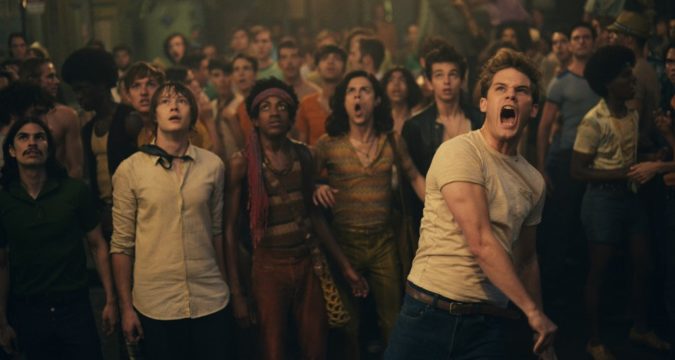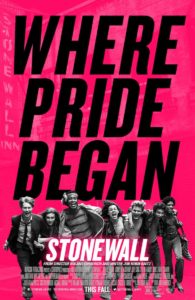

We previously reported on the controversy that erupted following the release of the first trailer for Stonewall, openly-gay director Roland Emmerich’s take on the 1969 riots that are widely cited as the start of the modern gay rights movement.
Some complained that the trailer “whitewashed” Stonewall’s history by focusing on a white male protagonist. Others argued that we should withhold criticism until the film could be judged in its entirety rather than solely by a brief and possibly unrepresentative trailer.
The film was released on September 25 to poor reviews. IMDb members currently rate it at 3.0 out of 10. Rotten Tomatoes’ audience members were more generous, with 94% liking it, but critics savaged it: only 9% of critics liked it, giving it an average score of 3.5 out of 10. Rotten Tomatoes critics’ consensus summarizes: “As an ordinary coming-of-age drama, Stonewall is merely dull and scattered – but as an attempt to depict a pivotal moment in American history, it’s offensively bad.”
Here’s what some top professional critics are saying about it:
David Lamble, Bay Area Reporter: “Sad to say, [Ronald Emmerich] has produced a complete travesty in Stonewall, a mishmash of campy dialogue and over-the-top acting that dances up to profound social/sexual change then beats a hasty retreat. The result may be illuminating only to grade-school kids, and perhaps only to the dull-normal among them.”
Daniel Reynolds, The Advocate: “Stonewall is a movie, not a piece of art. It is certainly not the end of the world. And as a piece of popcorn entertainment, it’s actually not bad.”
Mick LaSalle, San Francisco Chronicle: “Someday someone might very well make a movie masterpiece out of the Stonewall riots, which kicked off the gay rights movement in 1969, but Stonewall isn’t it. Though the film has already been criticized for historical inaccuracy, its biggest problems are artistic, a certain squandering of focus, a certain misplaced attention on the unimportant at the expense of the real story.”
Stephen Holden, The New York Times: “The strident tone of Mr. Baitz’s screenplay is so far removed from the subtlety and sophistication of his plays, like Other Desert Cities, and television shows, like Brothers and Sisters, that the most logical explanation for its bluntness is that he felt compelled to substitute strident melodrama and agitprop for psychological complexity.”
Gary Goldstein, Los Angeles Times: “As a fact-meets-fiction snapshot of what life was like – legally, politically, emotionally, sexually – for gay men and women more than 45 years ago, the film is a vital, evocative reminder of a turbulent time that paved the way for hard-fought freedoms. For that alone, it’s of value for younger audiences, gay or straight. However, for older moviegoers, particularly LGBT viewers who may have lived through the era depicted in Stonewall, the movie may feel simplistic and overly familiar.”
Maya Stanton, Entertainment Weekly: “When the film’s postscript – detailing the genuine struggles and accomplishments of the movement’s activists and the lasting policy changes effected, in part, by their work – is more touching than the movie itself, it’s obviously problematic. The Stonewall Riots were a triumph for a marginalized community, but Emmerich fails to convey the significance of the event in any meaningful fashion. The subject matter deserves better, and so do we.”
Bilge Ebiri, New York Magazine/Vulture: “Unfortunately, Roland Emmerich is a terrible filmmaker, and his efforts to make his protagonist ‘relatable’ backfire spectacularly. The director’s inability to handle anything resembling nuance or complexity is evident in the film’s treatment of Danny, whose desperation is depicted in the broadest strokes.… Maybe that’s the film’s greatest sin: doubling down on a hollow character while turning the epochal events being depicted — and, yes, the real people involved — into an afterthought.